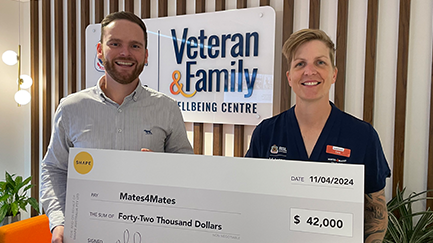
SHAPE golf day supports veterans and families
Mates4Mates partner, SHAPE has raised an incredible $42,000 to help support veterans and families impacted by service.

It may be difficult for partners of veterans to find time to take care of themselves and this can be emotionally and physically exhausting, leading to burnout and ‘compassion fatigue’.
Partners and carers of veterans can often experience high levels of stress when balancing the role of being a caregiver, managing family life, and work in the context of the unique challenges of Defence service.
Being aware of and utilising self-compassion can help Defence partners and carers to remain present and reduce overwhelming feelings that may impact their happiness.
So, what is self-compassion?
Self-compassion is the ability to be aware of our inner critic and become more understanding of our emotions without judgement, learning to instead direct feelings of kindness and care toward ourselves.
It is not uncommon to be self-critical, however, this may develop into patterns of a consistently negative mindset towards ourselves. As a result, we may struggle to accept that it isn’t possible to do everything perfectly and we may sometimes fail.
The ability to be self-compassionate is especially important when challenges arise, because these difficulties can lead to us being additionally hard on ourselves.
People may struggle with the concept of self-compassion for a number of reasons. If self-compassion was not role-modelled by others or encouraged in childhood during challenging times, the idea of being kind to ourselves when we don’t achieve something we believe we should be able to do can feel counter-intuitive.
Some people may associate being self-compassionate at a difficult time with becoming complacent by not pushing ourselves to overcome the hardship quickly.
The importance of self-compassion for partners of veterans
Partners and carers of veterans are often the primary caregivers for their families and as a result may feel that they must take on significant burdens by themselves in order to support their partner and/or children. This can cause stress levels to rise, and their inner critic may seem to become ‘louder’ and more persistent as things seem to slip out of control and challenges increase.
Practicing self-compassion allows partners and carers the opportunity to take care of themselves; it allows them to authentically feel their emotions, notice and accept challenges and work through them to return to a present and calm mindset.
Increased understanding of how self-criticism can impact on our emotional wellbeing, and noticing the unhelpful thought patterns that may develop, can make it easier to treat ourselves with kindness and care.
Other wellbeing benefits of self-compassion include improvements in mental health, increased social connectedness, feelings of happiness, optimism, perceived competence and motivation. These benefits may be helpful to improve the wellbeing of those in Defence families who may face some challenges specific to service.
Simple ways to practice self-compassion
Self-compassion can be seen as a challenging way of relating to ourselves, but it may be as simple as becoming more aware of our thoughts on a daily basis.
Here are some ways you can build self-compassion into your day:
Support at Mates4Mates
Mates4Mates provides a wide range of support services for partners of veterans including the Partners and Carers Program which provides participants with strategies to support their own mental health and wellbeing, tips on how to manage the impacts of transitioning from the Defence Force, and more. The next intake for this program will open in mid-March.
Other Mates4Mates support services for partners include a range of Skills for Recovery Programs, clinical services, and regular social connection activities such as BBQs, craft workshops, yoga classes, and much more.
As a partner of a veteran who has been impacted by service, you can apply to join Mates4Mates at any time. The veteran does not have to be registered with Mates4Mates for you to apply to join.
To find out more about how Mates4Mates can support you, reach out on 1300 4 MATES (62 837) for a confidential chat.
Written by Stacey Gillam, Mates4Mates Counsellor

Mates4Mates partner, SHAPE has raised an incredible $42,000 to help support veterans and families impacted by service.